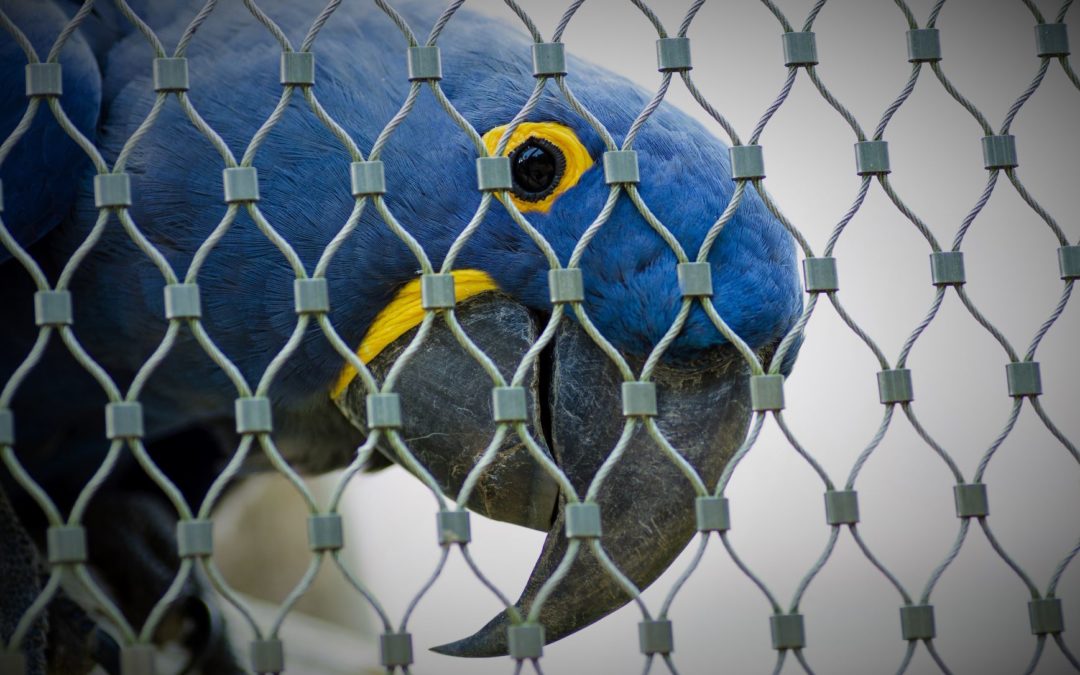I know a lot of people like the notion of owning an exotic pet, but how many exotic pets like the notion of being owned by people?
I’d like to say I have never wanted an exotic pet, but I have to confess, I did want yaks when I was really little and didn’t understand the habitat they required; and after seeing Werner Hertzog’s Fitzcarraldo I wanted an ocelot (I mean, what budding crazy cat woman hasn’t wanted an ocelot?) But I grew up in the country, surrounded by farm animals, so I never lacked for pets. I had pet goats and geese and ponies, as well as the usual dogs and cats. Then there were all the cows and sheep and ducks and chickens and horses on my mother’s lifestyle block. My father looked after some interesting injured birds while they recovered―a one-legged rosella name Captain Hook and a New Zealand wood pigeon by the name of Woody―and my brother rescued an injured hawk and a depressed, feather-pulling sulphur-crested cockatoo and nursed them back to health.
Okay, not gonna lie, I’d still love an ocelot – but would an ocelot love me?
So, plenty of animal stimulation for me… but I have to say, there is something about the keeping of exotic pets that disturbs me.
For starters, the very term ‘exotic pets’ makes me uneasy. The fact that they are classified as ‘exotic’ basically means that they are somewhere they shouldn’t be―or wouldn’t choose to be―and the word ‘pet’ means that they are being kept in a domestic environment (usually for human benefit, not their own). To my mind, this means ‘animals that shouldn’t be kept as pets being kept as pets’.
So, how is this different from other domestic animals? I think, and this is purely my opinion, that domestic cats and dogs are generally where they want to be. My understanding is that the domestication process was one of mutual benefit, which happened due to a desire from both sides―wild dogs and cats would not have been domesticated if they weren’t hanging around human habitats, wanting to join in the fun. It worked for both parties, and thus the house pet has evolved.
Not so with any animal you have to keep in a cage. Yes, I’m taking about bunnies as much as about bush babies here. If it’s in a cage because it is going to try and escape back to the wild if you let it out, is that really fair? It comes back to that whole dominance over the animal kingdom creed that we, as a species, have so badly misinterpreted.
Slow loris babies have their teeth pulled or cut by traders before being sold as exotic pets – often leading to infection and death. Sorry you had to see this, but you had to see this.
And then there is the exotic pet trade―and its ugly uncle, wildlife smuggling. Prior to regulations being put in place, wildlife smuggling for the exotic pet trade significantly contributed to the endangerment of certain species, and although it is not such a huge issue these days, the treatment of smuggled animals is often inhumane and results in many fatalities. Certain species of exotic pet that have been bred in captivity from captured animals imported to places like the United States are still legally available (the exotic pet trade in the States alone is worth $15 billion annually) but the illegal wildlife trade still generates an estimated $7 billion to $23 billion a year, according to the African Wildlife Foundation, an insane amount of money that we can safely assume is not being used to help poverty stricken African nations. While wildlife smuggling has declined, it is still very much a living industry. Just recently, authorities in Kolkata rescued 35 wild animals, including lemurs, a baby marmoset, a Bengal cat, and 30 exotic birds, that were being smuggled through the airport in five cramped cages. A baby marmoset, folks. If that hasn’t tugged on your heartstrings, I don’t know what will.
Baby marmoset, with Mama marmoset, where it should be
While I am entirely against the keeping of any caged animal, it is possible to have exotic pets without it being cruel and inhuman. Instead of getting a beautiful, exotic parrot that you have to keep enclosed, how about getting free-roaming peafowl (and a country house to accommodate them)? Instead of an ocelot, you might consider adopting a street cat from Thailand. (Aw! I just looked at the LAW cat adoption page and now I want to adopt!) More into canines? How about a desi dog from India? (Warning! Shameless Dharamsala Animal Rescue plug alert!)
There are plenty of ways to have interesting and exotic animals in your life without having to smuggle and incarcerate them. And if, like me, you just can’t live without a totally impractical species (yaks, in my case), then go to where they are. I moved to the Himalayas, where the yaks are much happier in their native environment than they would’ve been if I had tried to smuggle past NZ bio security and kept them in my back garden in New Zealand. See? There’s always a humane way around these things. As the proverb says: If you love something, set it free, or better yet, don’t put it in a cage in the first place, duh!
A yak, also where it should be
Words: Sharnon Mentor-King
Images: Lukas, Joel Santana, Dr. Karmele Llano Sánchez, Karin S, hbieser
Get our best articles straight to your inbox.
Subscribe to The DARling below:
About the author

Sharnon Mentor-King
Sharnon Mentor-King is a freelance writer and editor from New Zealand, currently living and writing in Dharamsala in northern India. When she’s not insulting peoples’ choice in pets, she writes bad poetry and excellent young adult fantasy. She has just finished her first novel, A Way to Return, which she has been working on for nearly half her life, and if her editor can get it down to a reasonable word-court, it will be a miracle. Let us pray.





